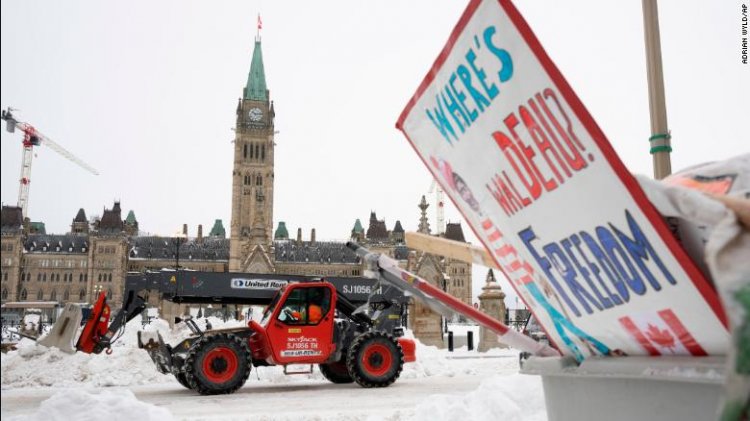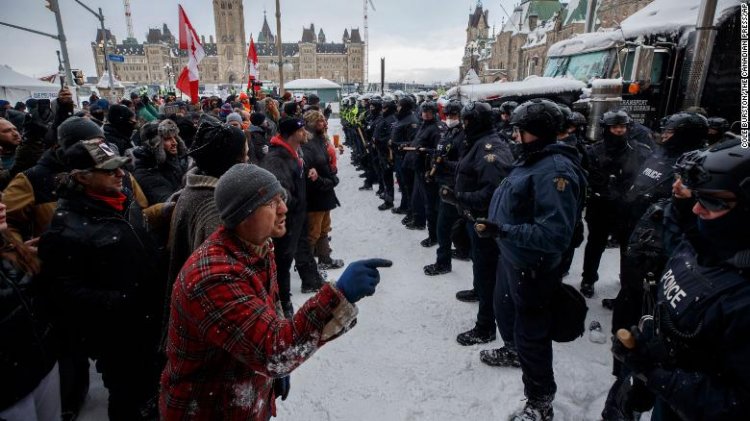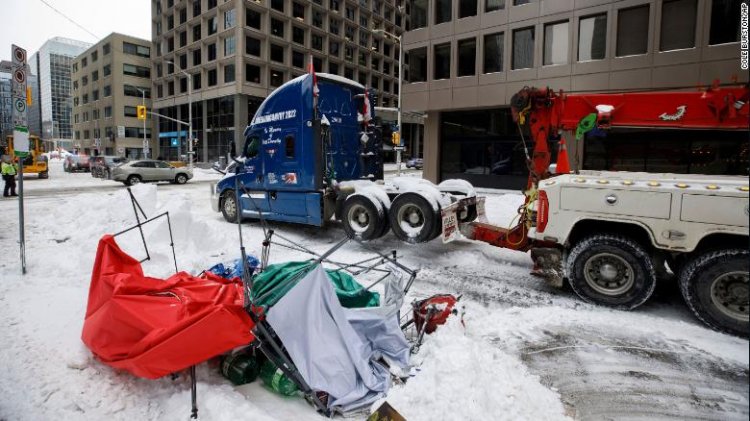After another weekend of arrests, Canada is looking to put an end to the Covid-19 protests with stiffer financial penalties.
A group of truck drivers opposed to a Covid-19 immunization and testing mandate launched the Ottawa protests in late January. However, others from outside the trucking business have joined in to express their displeasure with a variety of additional Covid-19 health initiatives, such as the need that students wear masks in school.

Another weekend of protests over Canada's Covid-19 mandates resulted in around 200 arrests in the nation's capital, as officials sought to put a stop to the weeks-long standoff by towing vehicles and levying financial fines on protestors.
Over the weekend, police used pepper spray and increased techniques to disperse crowds and make arrests in front of the Parliament building, according to police.
Protesters with smoke grenades and fireworks, as well as individuals wearing body armor, were among those arrested, according to police.
A woman was reportedly critically hurt during an encounter with a police officer on a horse, and a second incident in which an officer fired a less-than-lethal rifle at demonstrators is being investigated by Ontario's Special Investigation Unit.
At a press conference on Sunday, Ottawa Interim Police Chief Steve Bell said the number of demonstrators had dropped dramatically.
He did say, however, that inhabitants in the downtown area had awoken to the fence and a "very substantial police presence," as well as checkpoints all across the city.
"While I know everyone is relieved to see many of the illegal demonstrators have left, this is not our city's usual condition," he remarked. "Despite our recent victories, we still need these steps to prevent illegal demonstrators from returning."
According to Bell, 191 protestors were arrested and 107 people were charged. According to him, the charges included impeding police, disobeying a court order, assault, mischief, weapon possession, and attacking a police officer.
At the news conference, Chris Harkins, deputy commissioner of the Ontario Provincial Police, announced that 76 automobiles had been seized and impounded.
A group of truck drivers opposed to a Covid-19 immunization and testing mandate launched the Ottawa protests in late January. However, others from outside the trucking business have joined in to express their displeasure with a variety of additional Covid-19 health initiatives, such as the need that students to wear masks in school.
Officials promised to put an end to the protests by implementing unprecedented protocols, such as the Emergencies Act. Although the legislation authorizes the Canadian government to use armed forces, Prime Minister Justin Trudeau has stated that troops are not required.
Protesters have been fined as the sources of their money are scrutinized.
At a press conference on Sunday, Mike Duhaime, deputy commissioner of federal policing for the Royal Canadian Mounted Police (RCMP), said the Emergencies Act had aided the police operation.
"The provisions of this Emergencies Act have allowed us to maintain the cordon, limit travel, and ensure that we can continue to suffocate demonstrators with financial and other help," Duhaime added.

According to Duhaime, Canadian authorities blocked the funds of some individuals and companies suspected of being involved in the demonstration on Sunday.
According to Duhaime, the RCMP froze 206 financial items, including bank and corporate accounts, disclosed 56 entities related to vehicles, individuals, and corporations, shared 253 bitcoin addresses with virtual currency exchangers, and froze a payment processing account worth $3.8 million.
"We're still collecting important information on people, vehicles, and businesses, and we're in daily contact with the banking institution to help them," Duhaime said.
Officials are looking into how the blockades were sponsored, Canada's Foreign Minister Mélanie Joly said CNN's, Christiane Amanpour.
"We've started looking into whether there was any foreign interference. I've mentioned the problem with Secretary Blinken, and my Canadian counterparts have as well, since we're quite preoccupied with the fundraising, first through crowdsourcing, and then with the disinformation campaign that goes along with it "she stated
Meanwhile, Canadian officials said on Saturday that small businesses that we're unable to open due to blockades and suffered financial losses may apply for a grant of up to $10,000 that they would not have to repay.

According to the Federal Economic Development Agency for Southern Ontario, the funds, which amount to up to $20 million, can only be used for nondeferrable operational costs not covered by other federal programs.

 Boakyewaa Lawrencia
Boakyewaa Lawrencia 



































